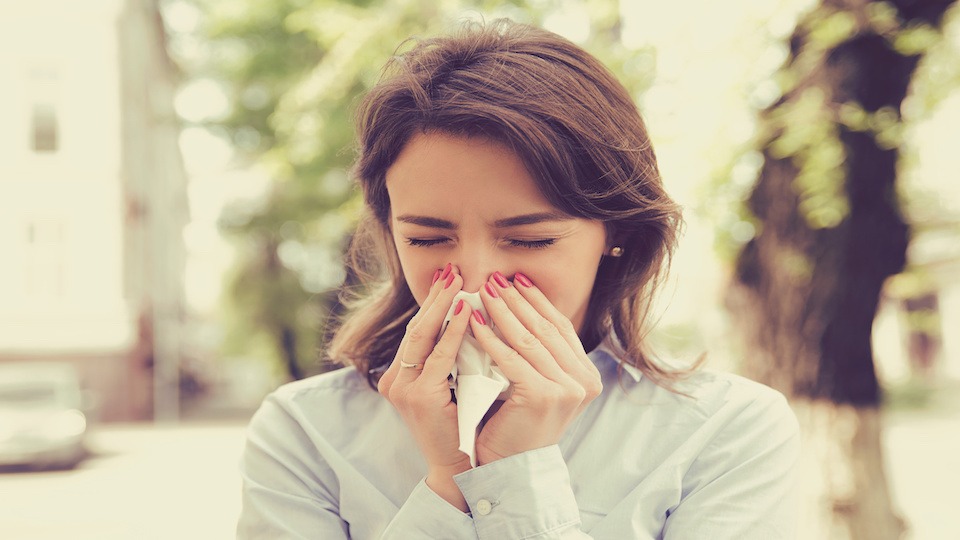Springtime brings many gifts. Flowers are blooming, honey bees are hard at work, and the warmer weather welcomes us to spend time outdoors. But there are unwanted gifts as well. The air is filled with pollen this time of year, and many of my patients are stressed out and suffering from the wheezing and sneezing brought on by seasonal allergies. My team at UpWellness has a few tips to help you minimize allergies this spring and get the most out of this beautiful season.
-JL
If a runny nose, itchy and watery eyes, sneezing and an irritating cough are plaguing you, it may be that you suffer from seasonal allergies. According to the American College of Allergy, Asthma, and Immunology, over 50 million Americans suffer from allergies each year. During the spring and summer, seasonal allergies can make you very uncomfortable. While there are over-the-counter and even prescription options available, many of them cause drowsiness and other side effects. The good news is, there are a number of natural ways to combat this annoying condition.
Apple cider vinegar
Unfiltered apple cider vinegar is not a fad or some kind of snake oil. When it comes to seasonal allergies, this fermented elixir might be an easy remedy for you. When taken internally, apple cider vinegar can help to reduce mucus production. Add one tablespoon to a cup of hot water and add a small amount of raw, local honey to sweeten. Drink daily or as needed during allergy season.
Local honey
When you experience allergy symptoms, it is your body responding to a substance that it deems is hazardous to your health. When your nose runs and your eyes water, your body is trying to flush the foreign substance out. One way to reduce symptoms is to help your immune system gradually adapt to the local habitat. You can accomplish this by consuming small amounts of the local grass and tree pollen that are causing the allergic response.
Since bees make honey from what is “in their neighborhood,” the golden goodness contains small amounts of the pollen that may be causing your symptoms. Regularly consuming local honey will help allow your body to trust your environment. With consistent local honey consumption, many people experience a gradual reduction in seasonal allergy symptoms.
Probiotics
In some cases, allergy symptoms are a result of your body’s immune system being imbalanced. This can cause you to have a more severe reaction to foreign stimuli – like pollen, dust, and grass.
Probiotics offer a boost to the immune system by introducing beneficial bacteria into your digestive tract. Fermented foods such as kimchi and Kombucha are great sources of healthy bacteria. For best results, try to consume fermented foods daily.
Drink water
Even low-level dehydration can disrupt your physiology in countless ways. Not drinking enough water can cause you to become moody and hungry. Dehydration also robs you of sleep, causes your skin to breakout and can bring on headaches and bloating. Poor hydration also makes allergy symptoms worse. Stay hydrated always, especially during allergy season.
Change up your diet
The healthier you are overall, the easier it is for your body to handle allergies. In addition, you may find that certain foods make your allergies worse. Many foods can initiate allergic reactions directly, others can suppress your immunity and make reactions more likely, and some foods can cause allergic symptoms because they are botanically similar and “cross-reactive” with allergenic wild plants. Here is a list of some common foods that may cause your symptoms to worsen:
- Cucumbers
- Melons
- Apple
- Pineapple
- Sugar
- Peanuts
- Banana
- Shellfish
- Soy
- Wheat
If you keep a food journal, it will be easy to see if any of these foods are a trigger. If so, eliminate them and keep track of your symptoms. Also, eat as many whole foods as possible.
Exercise
Although exercise is probably the last thing that you feel like doing when your eyes itch and your throat burns, it can help your allergy symptoms. Researchers in Thailand discovered that moderate to intense activity for at least 30 minutes could help to reduce allergy symptoms significantly. It is thought that exercise can alleviate inflammation in the nasal passages which, in turn, can reduce allergy symptoms. Just be sure to workout indoors if the pollen counts are high.
Neti pot and saline rinse
The nasal passages are comprised of hundreds of hiding places where dirt and pollen can hang out. As long as the foreign substance is in there, your body will keep trying to get rid of it, and allergy symptoms will persist. Using a neti pot helps you flush your nasal passages which can relieve your symptoms.
Your nasal passage is an elaborate system of tiny passageways. For most of us, these passageways are filled with nooks and crannies where dirt and pollen can easily be trapped.
Until that foreign substance is expelled, your body will most likely keep trying to flush it from your system. This can mean lots of mucous (aka a runny nose), coughing, sneezing, and watery eyes.
With a neti pot, you can use saline to flush your nasal passages and help relieve your allergy symptoms.
The next time your allergies are trying to get the best of you, fight back naturally!
-The UpWellness Team









